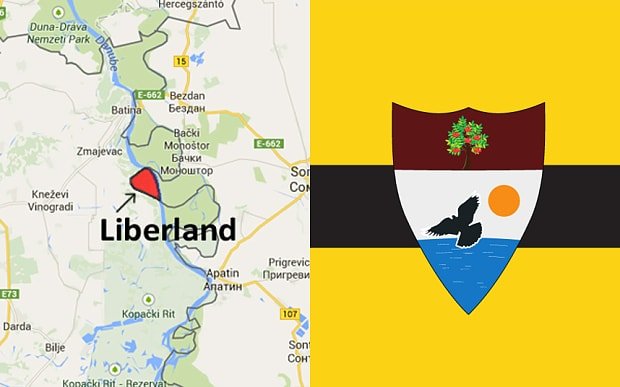
With the exception of the Arctic and the piece of desert between Sudan and Egypt, in the world there is only one piece of land, the property is not declared any state. Gornja Shiga - an uninhabited forest area of seven square kilometers on the Croatian side of the Danube River. The Croatian government claims that he - the property of Serbia. She did not agree. This makes the forest no man's land, the power of which belongs to no one.
No one until 2015, when thirty-libertarian political activist from the Czech Republic Vit Edlichka stuck a flag in the ground Gornji Sigi and declared it "Free Republic of Liberland". He quickly established a provisional government and issued a constitution, establishing management principles: voluntary taxation, minimum government interference, the absolute absence of speech and information constraints. You can do anything you want, as long as not physically harm others. The most free country in the world, says Vit. The first truly libertarian state. Tens of thousands of people almost immediately granted citizenship.
In April, the leaders of Liberlend held a conference . It was a kind of libertarian advice about sixty people from around the world discussed the advantages of small governments, voluntary taxation and ways to implement them on an uninhabited land. In the minds of all was blockchain. It is, if you have not heard, the technology, which is based cryptocurrency Bitcoin, whose principle of operation is to copy each transaction in the open, chronologically ordered, duplicated on thousands of computers and constantly they testable (whereby it is possible to add new records, but you can not change or remove existing) database. It is blockchain.
Many smart and technically competent people racked their brains trying to find him a new application. Vitalik Buterin created Ether, which allows people to perform in blockchain all types of computer programs. Microsoft used it in "Azure". EBay developed decentralized counterparts, Uber, Dropbox and more. Millions of dollars are invested in the technology.
However, residents of Liberlend particularly interested in applying blockchain policy. Chief scientific adviser of the British Government, Sir Mark Volport, said recently that the technology - a new secure and transparent way to keep track of financial, physical and electronic assets. He suggested that it might help against fraud, reduce errors and confirm the new property law (an excellent idea of George Gelloway - put budget spending blockchain).
"Follow my voice"
Adam Caleb Ernest - one of the founders of the founder of the project "Follow my voice." His first vote was the presidential election in the US in 2000 with their endless violations and perepodschёtami. Having got acquainted in 2014 with blockchain, he realized that an open, transparent vote base can solve many problems.
"We develop a provably fair electoral system." Adam Caleb Ernest
If the voice of each person will use its unique identifier and recorded in blockchain, a second vote will be impossible. The absence in the records of the names remain anonymous, automation will speed up calculations, and the openness and security-in database of the changes will allow anyone to independently verify the results. Stalin once said that the votes have no power: the power of those who believe them. With "Follow my voice," said the one who votes.
"Bitnation"
A more radical speaker was Suzanne Tarkovsky Tempelhov, founder of the project "Bitnation". She wants to use blokcheyn to replace the state. Here's how it works. First, you get a "citizenship" "Bitnation" - hash, loaded into the database. This gives access to services, such as a debit card, the host bitcoin, educational programs, physical security, etc. A great victory Suzanne - notary services, that can be used to certify documents and upload them to blockchain for eternal storage. Hernando de Soto, a Peruvian economist, argues that five billion people live without evidence of its ownership of the property, which makes them vulnerable to the whims of the state and hinders investments and loans. The proposed "Bitnation" services can rectify the situation. Even marriages are already in blockchain.
"Billions of people really need us, as their governments are too slow, expensive and corrupt" Suzanne Tarkovsky Tempelhof
Imagine a world in which adults are free to decide how to live. Blockchain technology allows you to create an agreement, without relying on intermediaries, especially in the government. "Smart contracts" - program implemented by the contract, automatically monitor compliance with the conditions. At the forefront voluntary - everyone chooses what to accept, what rules to live. Alas, while it is impossible. Governments impose our laws, extorting taxes, forcing the power to undesirable actions. However, Suzanne predicts a time when people will start to ignore their decision, because it is cheaper, more efficient and more freely. "For 50 years the world has changed", - she says.